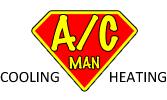Sealing Air Leaks Around Your Home – HVAC Repair In Houston
Leaks are a clear indicator that the pipes in your home are faulty or worn out. Most homeowners are well aware of the losses a leaky sink can cost them in terms of expensive repairs and high water bills. Air leaks are also equally destructive but unfortunately, many homeowners do not treat them with the same seriousness and urgency. When air leaks are left unresolved for a long period of time, they can result in a sharp increase in power bills as well as reduced weather insulation in your home. You can take charge of your energy consumption by identifying and repairing any and all air leaks in your home. The tips below should help you achieve this.
What Are Air Leaks?
Closely identical to pipe leaks, air leaks are specific areas where your home’s warmed or cooled air escapes to the outside world. When this happens, energy is lost in the process of regulating the air that escapes and also from your system working harder to keep your home’s indoor temperature ideal. Your energy bills inevitably go up. Air leaks are common in thin walls facing the outdoors or along ductwork and piping in the inside walls of your home. When looking for air leaks, it is important to carefully scrutinize the following areas:
- Garage doors and walls
- Fireplace walls and chimneys
- Attic walls
- Piping and duct shafts
- Recessed lighting
- Outdoor-facing walls in the common areas
- Exterior doors and windows
- Walls situated between attached units or extensions
Your local HVAC technician can help you to assess these and many other areas for possible air leaks in your home.
How Can I Stop Air Leaks From Affecting My Power Bills?
Older homes and homes built on a tight schedule may not be properly constructed or equipped with the quality materials needed to mitigate air leaks. As years go by, the weather and caulking stripping on your home’s weakest points can gradually wither and decompose causing exposure of air vents to outdoor elements. Luckily, there is a solution to this problem known as resealing. Resealing your home is a fast, reliable and affordable way of fixing air leaks. A professional HVAC technician can help you to repair any existing leaks as well reapply a lasting weather and caulking stripping to your home.
If you want to be fully certain that your home is able to maintain the temperature you choose, there are numerous upgrades you can make to ensure the air inside your home stays in and the air outside remains out. Replacing your exterior-facing doors and windows with more energy-efficient options can enable your HVAC system to work less and therefore run longer. You should also ensure that you have pliable sealing thresholds along all door bottoms.
In homes with fireplace flues, kitchen fans or dryer vents, installing coverings for all these fixtures is important to prevent air from escaping to the outdoors.
Save Money on Your Power Bills By Seeking Help From AC Man of Houston
Energy and power bills are probably one of the biggest cost a homeowner has to incur on a monthly basis. You shouldn’t allow air leaks to force your energy bills to get out of hand. Take action today to ensure that your home is properly outfitted, caulked and sealed with energy-efficient doors and windows.
Residents of Houston can get help with air leaks by calling AC Man of Houston. We specialize in top-notch energy-efficiency services. We are more than willing to help you out so don’t shy away from contacting us or calling today!
